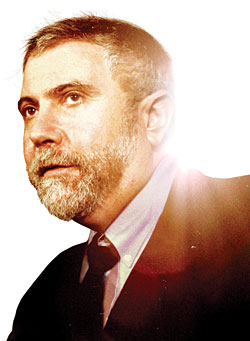
Before Paul Krugman joined the New York Times op-ed page, it was a genteel place. The classic pattern was to promote distinguished reporters to cushy sinecures as columnists. Because they were trained as reporters, not polemicists, they tended to avoid the work of argumentation and simply tell readers what to think. Why believe him? Because he is a famous newspaperman. Maintaining the columnist’s dignity was the whole point. Accordingly, columnists were told not to debate each other, for roughly the same reason that parents refrain from arguing in front of the children. Krugman, by contrast, came from academia, where the arguments are fierce, and you either bring the data or you go home. As one of the most acclaimed economists of his generation, he arrived at his Times post in 1999 boasting stronger credentials to hold forth on his chosen topic than possibly any other op-ed columnist in history. But Krugman does not rely on his authority. He crafts arguments.
The most remarkable attribute Krugman has brought to the Times is rudeness. The social niceties that accompany his exalted position are utterly lost on him. He does not seek out the company of famous politicians and cannot be courted with flattery or access. He understands that you can’t arrive at truth without explaining why mistaken beliefs are wrong.
Krugman makes a mockery of the prohibition against arguing with his fellow columnists, larding his columns with rebuttals to unnamed subjects who happen to believe things that were advocated on the Times op-ed page earlier in the week. Thomas Friedman writes a column complaining, “Does anyone know what President Obama’s preferred outcome is? Exactly which taxes does he want raised, and which spending does he want cut?” And the next day, Krugman writes: “Oh, and let me give a special shout-out to ‘centrist’ pundits who won’t admit that President Obama has already given them what they want. The dialogue seems to go like this. Pundit: ‘Why won’t the president come out for a mix of spending cuts and tax hikes?’ Mr. Obama: ‘I support a mix of spending cuts and tax hikes.’ Pundit: ‘Why won’t the president come out for a mix of spending cuts and tax hikes?’ ”
Krugman’s favorite in-house target is David Brooks, a vessel for the respectable and generally mushy-headed conventional wisdom Krugman loathes. Last spring, Brooks wrote a column bemoaning the lack of civility in Washington, citing President Obama’s failure to invite arch-nemesis Paul Ryan for lunch. Krugman wrote mockingly in response, “The president, we were told, was being too partisan; he needs to treat his opponents with respect; he should have lunch with them, and work out a consensus.” The headline of Krugman’s column—“Let’s Not Be Civil”—neatly summarized his ethos. He is the man who was invited into the club and refused to be clubby.
